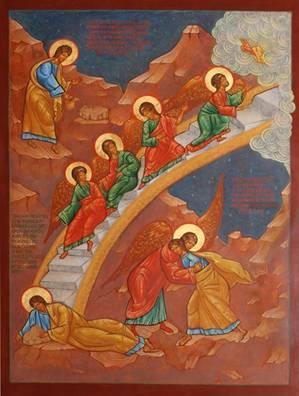Jacob
JACOB
Possible Lesson Plan:
- Open with prayer.
- Scripture reference: Genesis 25:21-34, chapters 27-33. Lots of new people to meet in these chapters. How about giving each student a character – Laban, Leah, Rachel, Esau, Jacob – or a place – Beersheba, Bethel, Haran, Mizpah – summarize a biography or history of the place: who, what, when, where, why? Add Rachel and Leah to your growing family tree. What is the meaning of the dream about the ladder going to heaven? Why did God give Jacob this dream? How did Jacob change? Who is Israel and why?
- Service References: The vision of Jacob’s Ladder in Genesis 28:10-17 is the reading for the Nativity of the Theotokos at vespers and again in the vespers of the Annunciation. Why? In matins of Annunciation an explanation is given – that the Ladder is a prefigurement of Mary: “The Holy Scriptures speak of thee mystically, O Mother of the Most High. For Jacob saw in days of old the ladder that prefigured thee, and said: ‘This is the stair on which God shall tread.’ Therefore, as is meet, dost thou hear the salutation: ‘Hail, thou who art full of grace: the Lord is with thee.’” She is again referred to as the “heavenly ladder” in the eighth tone of weekly vespers. How is Mary a ladder to heaven?
In the canon of St. Andrew of Crete, sung during the first week of Great Lent, the saint views the ladder in this way: “The ladder which long ago Jacob the great patriarch saw is for you, O my soul, an image to consider. The bottom most rung is a first step towards doing the will of God, while those that follow lead to a true knowledge of Him. Therefore, renew your Life if you wish to do God's work, to receive knowledge and insight.” – a true Lenten climb!
When Jacob blessed the 2 sons of Joseph (Who are they?) in Genesis 48:14, he crossed his hands. In the vespers of the feast of the Holy Cross, St. Cyprian says: “The crossing of his hands by the Patriarch Jacob at the blessing of his children foreshadowed the mighty token of Thy Cross.” Why did Jacob cross his hands? How did that foreshadow the cross?
Genesis 49:1-12 is read on Palm Sunday. Read the prophecies about Judah – “he whom thy brethren shall praise…binding his … ass’s colt unto the choice vine…his clothes in the blood of grapes…” Prefigures Christ?
Finally, the marriage of Jacob with Rachel (but not Leah?) is again referenced in the marriage service. Why?
- Discussion: We have here an entire group of cheaters and liars! Who? When? What about Jacob and Esau, Laban with Leah, Laban with the wages, Rachel with the household idols? Teens must make moral choices every day. Cheating is one that frequently confronts them. There are plenty of opportunities to cheat in the high school environment. Examine the different aspects of cheating and how a Christian student can cope. How prevalent is the practice of cheating? Let the students share their gripes about cheating: giving an unfair advantage, some teachers make it easy (like Isaac being blind?), etc. What percentage of the students at each teen’s school cheat? Why do they cheat? List some reasons (e.g. laziness, too busy to study, pressure to get good grades, everybody else does it, etc.) and rank them from best to worst. Are there times when a student has to cheat? Is cheating worth the risk?
What is the definition of cheating? Ask the students if the things listed below would be serious cheating, barely cheating, or not cheating at all:
- Copying from someone else’s test paper.
- Writing the answers for the test on your arm.
- Getting the answers from someone who took the test last period.
- Letting a friend copy answers from your test.
- Using a test from last year as a study guide.
- Copying an answer from someone else’s homework.
- Letting someone copy an answer from your homework.
Which are active cheating? Passive cheating? Did Jacob actively cheat Esau? Laban and Jacob? Is cheating OK as long as you don’t get caught? What were the results of Jacob’s cheating Esau? Laban cheating Jacob? Does cheating finally “catch up with you”? Rachel lied about the household idols. Jacob lied to Isaac. Why did they lie? Is there a difference between a “little white lie” and a real lie? Give examples of what you would classify as a “little white lie” and a real lie. Is a lie really a lie if the intention is good? What reasons would justify telling a lie? Brainstorm here: To get out of trouble, to protect a friend, to avoid hurting another’s feelings, to keep a secret, to get something you haven’t earned… Is there a difference between lying and not telling all the truth?
Bring the lesson home: When was the last time you lied? Cheated? Why? Could you have avoided it? How? What were the consequences? Did you feel comfortable telling the lie? Cheating? Is there a lie you wish you could untell?
 Close with prayer: Pray for the strength to act and speak the honest truth for the entire week.
Close with prayer: Pray for the strength to act and speak the honest truth for the entire week.